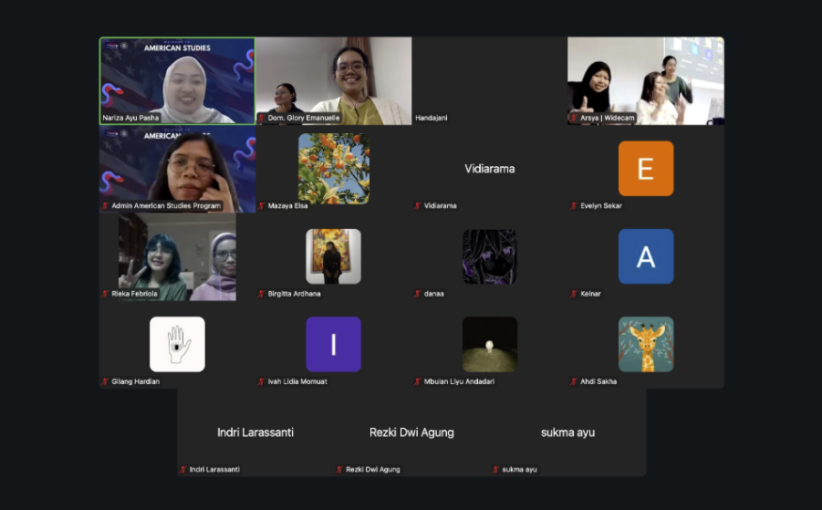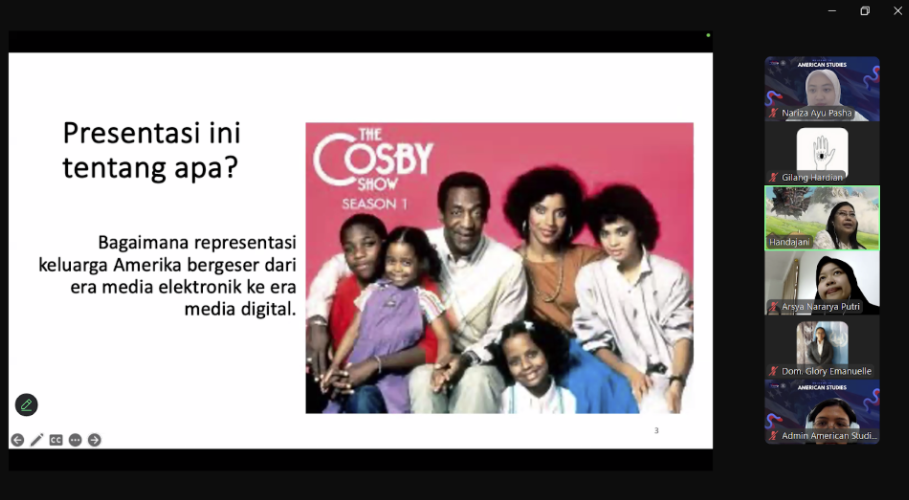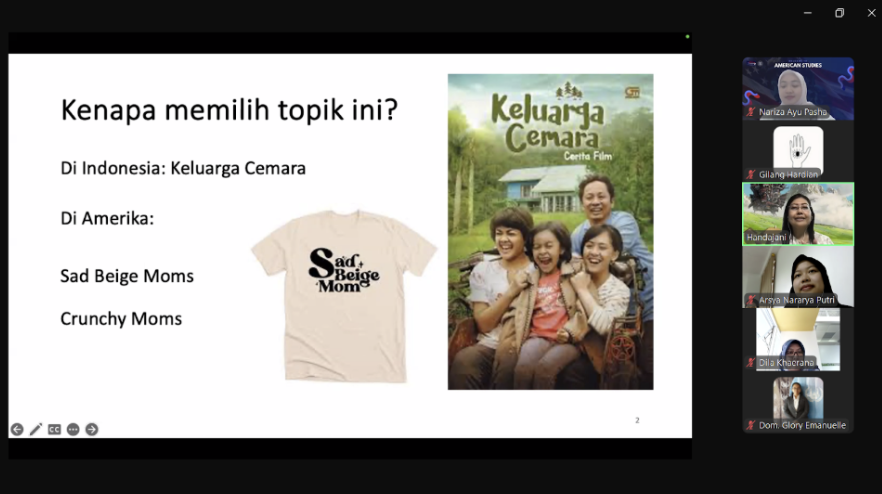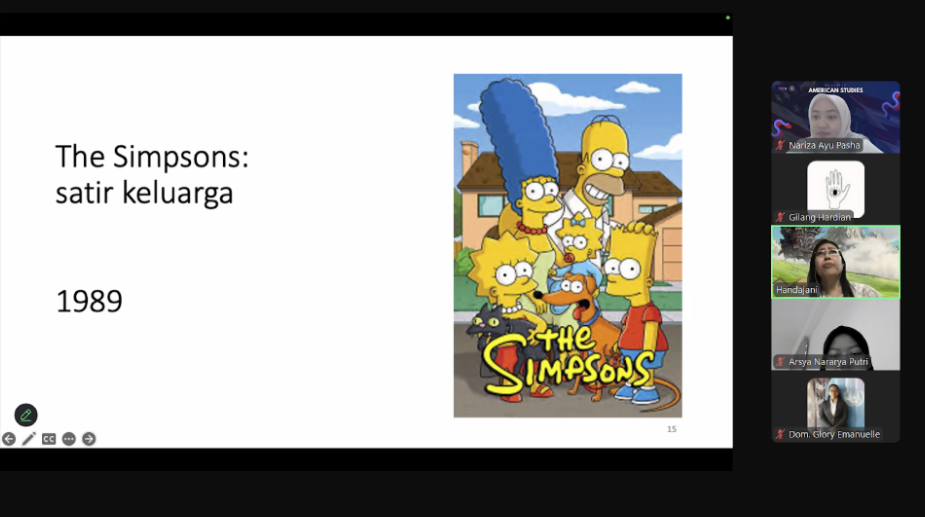
Yogyakarta, 21 May 2025 — American Studies Students and Alumni Association (ASSAA), bekerja sama dengan Program Studi Kajian Amerika Universitas Gadjah Mada (UGM), menyelenggarakan kuliah umum bertajuk “Representations of American Families in the Media” pada hari Rabu, 21 Mei 2025, pukul 10.00–12.00 WIB (Waktu Jakarta).
Acara ini menghadirkan Dr. Suzie Handajani, M.A., dosen di Departemen Antropologi, Fakultas Ilmu Budaya, Universitas Gadjah Mada, sebagai pembicara utama. Dalam kuliah umumnya, Dr. Suzie mengupas bagaimana keluarga-keluarga Amerika ditampilkan dalam berbagai bentuk media—mulai dari televisi dan film hingga iklan. Ia menjelaskan bahwa representasi tersebut tidak hanya mencerminkan nilai-nilai budaya yang hidup di masyarakat Amerika, tetapi juga dapat memperkuat bahkan menantangnya. Melalui berbagai contoh, Dr. Suzie menunjukkan bagaimana media berperan penting dalam membentuk persepsi publik tentang apa itu “keluarga” dan seperti apa idealnya kehidupan keluarga dalam konteks Amerika.
Dengan latar belakang keilmuan di bidang antropologi budaya dan kajian media, Dr. Suzie mengajak para peserta untuk mengkaji secara kritis berbagai stereotip, narasi dominan, dan dinamika sosial yang muncul dari representasi keluarga dalam media Amerika. Topik ini menjadi sangat relevan, tidak hanya bagi mahasiswa Kajian Amerika dan Ilmu Budaya, tetapi juga bagi siapa pun yang tertarik pada studi media, komunikasi, serta dinamika keluarga dalam konteks global. Melalui pendekatan lintas disiplin, peserta diajak untuk melihat bagaimana media bukan sekadar hiburan, tetapi juga ruang produksi makna yang memengaruhi cara kita memahami dunia sekitar.
Dalam paparannya, Dr. Suzie Handajani menyoroti bagaimana representasi keluarga Amerika mengalami perubahan signifikan seiring transisi dari era media elektronik seperti televisi ke era media digital. Salah satu contoh yang ia angkat adalah The Cosby Show, sitkom populer dari era 1980-an yang menampilkan kehidupan keluarga Afrika-Amerika kelas menengah atas. Tayangan ini dipandang sebagai upaya membangun citra ideal keluarga kulit hitam di mata publik Amerika maupun dunia—sebuah langkah penting dalam membingkai ulang persepsi terhadap komunitas Afrika-Amerika melalui media arus utama.

Namun, menurut Dr. Suzie, representasi keluarga dalam media tidaklah bersifat statis. Seiring berkembangnya media digital dan kemunculan platform streaming, narasi tentang keluarga Amerika menjadi jauh lebih beragam, inklusif, dan kompleks. Media digital membuka ruang bagi munculnya berbagai suara dan perspektif yang sebelumnya jarang terwakili dalam media arus utama, mulai dari keluarga dengan latar belakang ras, kelas, dan orientasi seksual yang berbeda, hingga dinamika keluarga non-tradisional yang kini mendapat tempat lebih luas dalam lanskap budaya populer.

Kuliah ini berlangsung dengan suasana yang interaktif dan penuh antusiasme. Para mahasiswa tidak hanya mendengarkan, tetapi juga aktif berdiskusi, berbagi pandangan, dan membandingkan pengalaman mereka tentang media dan konsep keluarga dari berbagai budaya. Diskusi ini menjadi ruang refleksi bersama tentang bagaimana tayangan yang kita konsumsi sehari-hari bisa secara halus membentuk cara pandang dan harapan kita terhadap kehidupan berkeluarga.

Sebagai tambahan, dalam presentasinya Dr. Suzie juga menyinggung sejarah tayangan Amerika yang pernah menghiasi televisi Indonesia sejak tahun 1990-an, sebelum sinetron lokal mulai mendominasi layar kaca. Serial-serial seperti Married with Children, Young Sheldon, hingga The Simpsons diangkat sebagai contoh bagaimana media membentuk berbagai arketipe keluarga, mulai dari yang absurd dan jenaka hingga yang cerdas dan tidak biasa. Tayangan-tayangan ini bukan hanya menghibur, tetapi juga membawa serta nilai-nilai dan cara pandang khas Amerika yang secara tidak langsung turut memengaruhi penonton di Indonesia.
Kuliah ini merupakan bagian dari mata kuliah Kajian Media dan Budaya Populer, yang dirancang untuk mendorong mahasiswa berpikir kritis terhadap representasi sosial dalam media. Melalui pendekatan interdisipliner, mata kuliah ini mengajak mahasiswa untuk tidak hanya menjadi konsumen media, tetapi juga pembaca yang sadar dan reflektif terhadap pesan-pesan budaya yang disampaikan lewat berbagai bentuk tayangan populer.
[Humas Pengkajian Amerika, Gilang Hadian]

